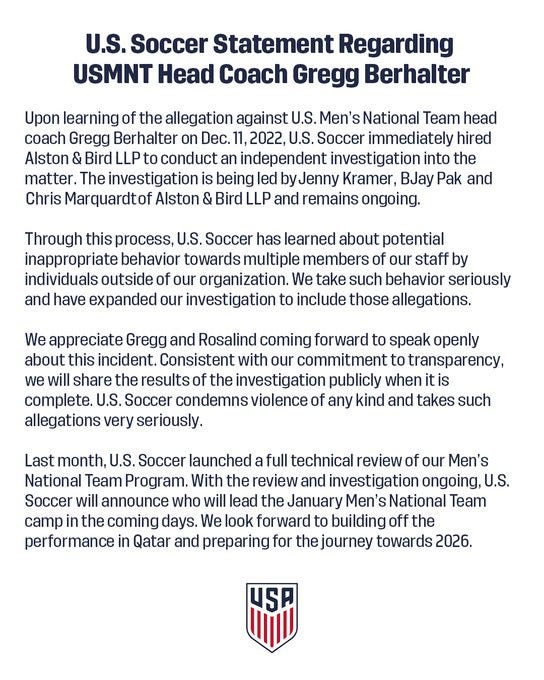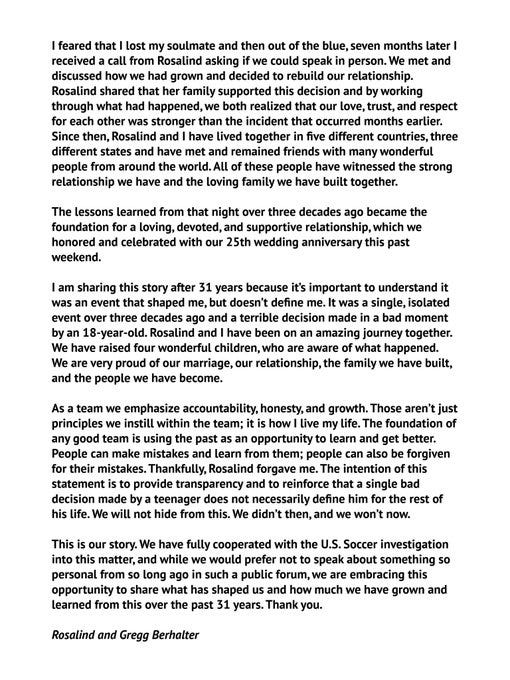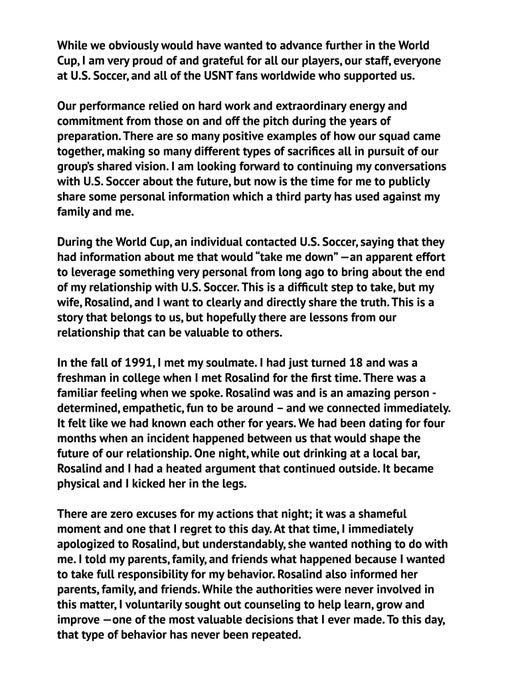My Thoughts on Gregg Berhalter
What the recent allegations mean for the USMNT head coach.

Spoiler alert: nothing good.
Just over four years ago, the United States Men’s National Team hired Gregg Berhalter as their head coach. The former Columbus Crew head coach was the proposed solution for a program that failed to qualify for the 2018 World Cup after a disastrous campaign under Bruce Arena.
Qatar was supposed to be his swan song - the culmination of blood, sweat and tears following that fateful night in Trinidad. Questionable squad decisions aside, the batch of 26 players slated to represent the Stars and Stripes was oozing with talent and potential. 17 players at European clubs. 14 players under the age of 25. All but one anxious to make their debut at football’s greatest stage.
After failing to qualify for Russia, the hope built up in the heart of American soccer fans teetered on overconfidence. Qualifying for the knockouts was no longer the minimum. The fans expected more. Why couldn’t the United States win Group B over England? Would Netherlands or Senegal pose that much of a challenge en route to the quarterfinals? Was a date with a European or South American giant in the semis too much to ask?
All of these expectations, as we know now, were for nought. And yet, the display against the Netherlands in the round of 16 was the least covered story from the tournament. The US were the first team to keep Cody Gakpo off the scoresheet or have more possession than the Oranje. They outshot the Netherlands. That’s not to say it was a great performance — far from it, in fact. However, all the focus in the aftermath of that game, and in the subsequent weeks, fell on the man in charge: Gregg Berhalter.
No one could figure out why he refused to make a sub until the 65th minute (apart from Christian Pulisic’s injury against Iran) in any of the group stage games. His solution to the lack of an out-and-out striker — a carousel of starts for three players (Sargent twice, Wright, and Ferreira) — combined for one shot on goal across 280 minutes of football. Despite having a midfield as strong as McKennie–Adams–Musah, the United States was only attempted 16 tackles in the middle third, the second-worst total in the entire tournament.
When the final whistle blew in the Netherlands game, Berhalter had exactly 28 days left on his contract. I didn’t think U.S. Soccer had it in them to let him go early. Nonetheless, Berhalter didn’t help his cause by airing out his dirty laundry at a “leadership summit” to throw Gio Reyna under the bus for his actions in Qatar. Reyna’s response seemed to close the discussion (at least publicly), and the countdown continued to tick toward December 31st.
When the clock struck midnight, ringing in the new year, there was no statement from Berhalter nor U.S. Soccer. Had he signed an extension? Was there a search for his replacement? The process of dismissing a coach, as we saw with Luis Enrique and Roberto Martinez, is swift. A quick conversation with the federation, a public “we want to thank ‘X’ for their contribution” and the manager is relieved of their duties.
When I checked my email this afternoon, a press release sat at the top of my inbox. The sender? None other than U.S. Soccer Communications, the official media arm of U.S. Soccer and its respective national teams. I half-expected the consolation note described above, but I quickly realized the message wasn’t a good one. Some of the things I saw would spell the doom of anyone’s career.
An ongoing legal investigation into an allegation against Gregg Berhalter. Reports of “inappropriate behavior” toward U.S. Soccer officials by “individuals outside of our organization.” Most indicative of the situation, as I came to learn, was one word buried in the latter half of the statement:
Violence.

Like others I talked to, I had no clue what the allegations were. The key to this story, and the part that I missed, was a message published 15 minutes earlier from a Twitter account claiming to be Gregg Berhalter. The tweet, released at 1:30 p.m., consisted of a letter with two very different but intertwined stories.
First, Berhalter claimed he was blackmailed during the World Cup. He said an individual contacted U.S. Soccer and threatened to unearth “very personal” information regarding the USMNT head coach - information that, when brought to light, could “bring about the end of [Berhalter’s] relationship with US Soccer.”
Then, Berhalter offered something you don’t see often in today’s society: an explanation. In an effort to uphold the integrity of the statement, I will not summarize nor abbreviate his words. They are pasted in full below:


Before I continue, I want to make one thing clear: There is no place for domestic abuse in any situation. No form, manner or severity should be tolerated or excused. All perpetrators of domestic violence should, if found guilty, be prosecuted to the fullest extent of the law.
What Gregg Berhalter did is deplorable and indefensible. His age and his immaturity are not valid excuses. No amount of alcohol can justify his actions. I applaud Rosalind’s brave decision to take herself out of the situation, and I can only hope that she received the proper care (physical and mental) following the altercation.
Berhalter knows he was in the wrong. He doesn’t need me or any other journalist to lambast him for something that happened over 30 years ago. It’s definitely not my place to criticize Berhalter or Rosalind for reconciling their differences after seven months. I’m glad that the two could reestablish the level of trust necessary for a successful relationship, and I hope their marriage has been nothing but happy and healthy in the years since.
On the other hand, whoever thought to use this information to blackmail Berhalter is evil. Plain and simple. Someone out there lacks a moral conscience to the extent that they were willing to threaten someone’s livelihood during the biggest moment of their career. I hope that the independent investigation hired by U.S. Soccer finds the person(s) responsible if only to understand why they tried to undermine Berhalter.
After digesting both statements, a clear distinction needs to be made between Gregg Berhalter, the person, and Gregg Berhalter, the coach. The person did something utterly despicable as an 18-year-old. Anyone who says otherwise is lying to themselves. With all that in mind, I believe people are better than their worst moment, and I applaud the steps Berhalter took to mend the chaos he caused. No one deserves to be blackmailed, intimidated or extorted — especially not during the World Cup.
The coach has run out of time. The court of public opinion holds nothing back, and two incidents in less than a month is a terrible look for U.S. Soccer.
Credit must be given where it’s due - defeating Mexico in the finals of both the Gold Cup and the CONCACAF Nations League were incredible achievements. Outside of those tournaments, his performance in this World Cup cycle was lackluster.
Failing to score in five of seven World Cup qualifiers away from home
Avoiding the intercontinental play-off ahead of Costa Rica on goal differential
Abominable showings against Japan and Saudi Arabia in September’s tune-up matches, the last official competition before the World Cup
Only scoring three goals in Qatar and failing to take advantage of a mediocre Dutch performance in the round of 16
There was also a smorgasbord of tactical missteps. Berhalter’s method of finding a true striker — rotating wingers and attacking midfielders ad nauseam into the starting XI — was painful to watch. His fascination with aging MLS players (Aaron Long, Jordan Morris, etc.) was a slap in the face to talented youngsters like Jordan Pefok and Erik Palmer-Brown plying their trade abroad. Above all, Berhalter’s refusal to change his style of football was shocking. No one expected the USMNT to mimic Pep Guardiola and Manchester City, but it didn’t take a genius to realize that Berhalter didn’t have the players on hand to make the system work. Those with the most success at the international adapt their methods to their current squad, but Berhalter was too stubborn in his quest to force positional play on the USMNT.
As hosts, the United States will auto-qualify for the 2026 World Cup. With the doubt created by qualification a non-factor, why not take a risk on someone new?
It’s time to say goodbye to Gregg Berhalter — not for his actions 31 years ago, but for the growth of American soccer and the USMNT’s ability to compete with the world’s best on the pitch.

